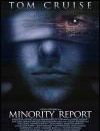 In
Minority Report director Stephen Spielberg
brings to the screen a 1956 sci-fi short story by Philip K.
Dick that is his what he calls his "ugliest, dirtiest
movie." The year is 2054, six years into an elaborate
experimental program operated in the District of Columbia
to fight violent crime before murders are committed, using
the powers of premonition of three psychics who are held in
a water tank against their will. All those arrested are placed
in a state of suspended animation, since they cannot be charged
in court with actually having committed a crime. Police Chief
Paul Anderton (played by Tom Cruise) joined the Department
of Precrime, as the program is named, at the inception in
2048 upon the death of his precious six-year-old son. Because
not a single murder has been committed during the six-year
trial, Director Lamar Burgess (played by Max Von Sydow) is
eager for a nationalization of the program, but Danny Witwer
(played by Colin Farrell) is on the premises of the facility
when the film begins to make inquiries on behalf of the Attorney
General of the United States. Presumably, Burgess will lose
his chance for fame and fortune if the federal government
nationalizes his crimefighting program. To demonstrate how
the system works, we view how one murder is foreseen and prevented
in the early part of the film. However, soon thereafter Anderton
is disturbed to learn that he has been identified as the next
killer, so he does everything that he can to evade pursuit
and capture, including kidnapping Agatha (played by Samantha
Morton), the key psychic, who tells him that all three psychics
fingered him; there was no minority report, as when only two
of the three sometimes might see the same vision. Eventually,
Anderton is arrested, but not without planting a seed of doubt
about Burgess's integrity in the mind of key researcher Iris
Hineman (played by Lois Smith), who later rescues him in order
to expose Burgess for murdering Agatha's mother and then covering
up the crime. Accordingly, after all the sound and fury of
hi-tech gadgetry and surveillance overkill, the Department
of Precrime is abolished, and all those formerly arrested
are released though kept under surveillance. Yet while most
filmviewers will be transfixed by the special effects razzle-dazzle,
the concept of a Department of Precrime is not really science
fiction any more. The current effort to prevent acts of terrorism
clearly involves a precrime scenario. Similar to Minority
Report, the accused are being locked up, in some cases
with no expectation of a speedy trial. But unlike Minority
Report, the evidence against them could be unsubstantiated
rumor. Democratic due process, in other words, takes a back
seat to national security. MH
In
Minority Report director Stephen Spielberg
brings to the screen a 1956 sci-fi short story by Philip K.
Dick that is his what he calls his "ugliest, dirtiest
movie." The year is 2054, six years into an elaborate
experimental program operated in the District of Columbia
to fight violent crime before murders are committed, using
the powers of premonition of three psychics who are held in
a water tank against their will. All those arrested are placed
in a state of suspended animation, since they cannot be charged
in court with actually having committed a crime. Police Chief
Paul Anderton (played by Tom Cruise) joined the Department
of Precrime, as the program is named, at the inception in
2048 upon the death of his precious six-year-old son. Because
not a single murder has been committed during the six-year
trial, Director Lamar Burgess (played by Max Von Sydow) is
eager for a nationalization of the program, but Danny Witwer
(played by Colin Farrell) is on the premises of the facility
when the film begins to make inquiries on behalf of the Attorney
General of the United States. Presumably, Burgess will lose
his chance for fame and fortune if the federal government
nationalizes his crimefighting program. To demonstrate how
the system works, we view how one murder is foreseen and prevented
in the early part of the film. However, soon thereafter Anderton
is disturbed to learn that he has been identified as the next
killer, so he does everything that he can to evade pursuit
and capture, including kidnapping Agatha (played by Samantha
Morton), the key psychic, who tells him that all three psychics
fingered him; there was no minority report, as when only two
of the three sometimes might see the same vision. Eventually,
Anderton is arrested, but not without planting a seed of doubt
about Burgess's integrity in the mind of key researcher Iris
Hineman (played by Lois Smith), who later rescues him in order
to expose Burgess for murdering Agatha's mother and then covering
up the crime. Accordingly, after all the sound and fury of
hi-tech gadgetry and surveillance overkill, the Department
of Precrime is abolished, and all those formerly arrested
are released though kept under surveillance. Yet while most
filmviewers will be transfixed by the special effects razzle-dazzle,
the concept of a Department of Precrime is not really science
fiction any more. The current effort to prevent acts of terrorism
clearly involves a precrime scenario. Similar to Minority
Report, the accused are being locked up, in some cases
with no expectation of a speedy trial. But unlike Minority
Report, the evidence against them could be unsubstantiated
rumor. Democratic due process, in other words, takes a back
seat to national security. MH
I
want to comment on this film